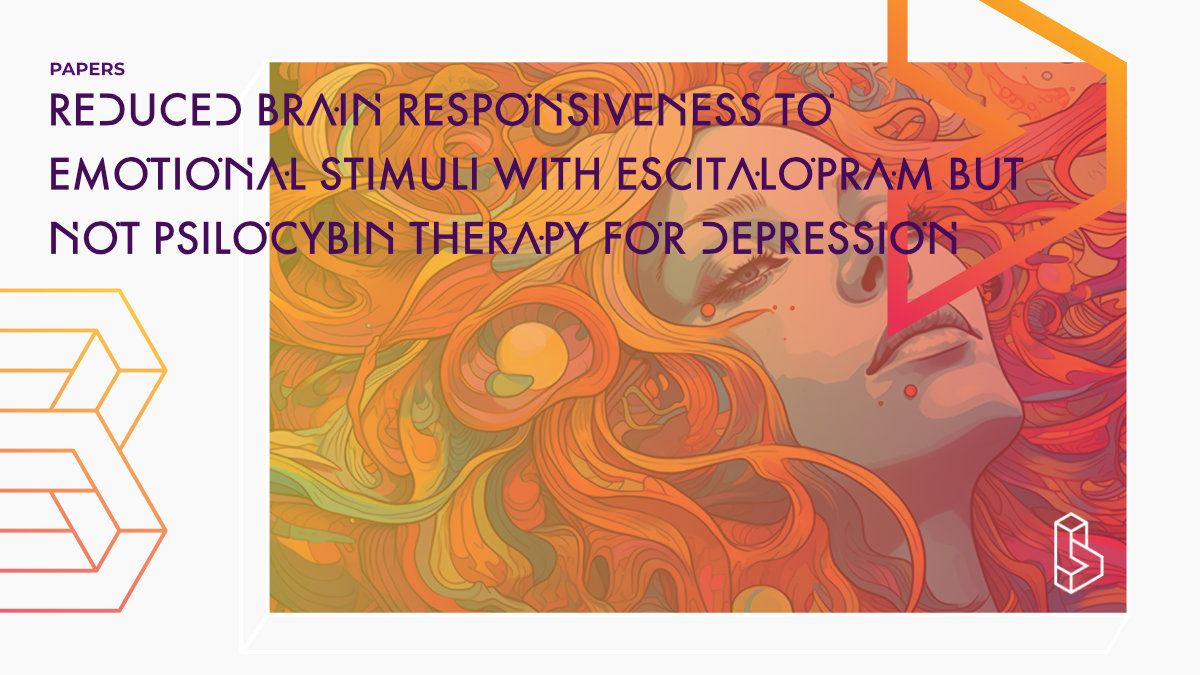This secondary analysis of an RCT (n=59) investigates the impact of psilocybin-assisted therapy (PAT) and escitalopram (SSRI) on responsiveness to emotional stimuli in patients with moderate-to-severe major depressive disorder over a 6-week trial period. Responses to emotional faces were reduced in the SSRI group, not the psilocybin group at the follow-up.
Abstract of Reduced Brain Responsiveness to Emotional Stimuli With Escitalopram But Not Psilocybin Therapy for Depression
“Objective: Psilocybin is an emerging intervention for depression that may be at least as effective as selective serotonin reuptake inhibitors (SSRIs), but effects of the two treatments on the neural correlates of emotional processing have never been directly compared.
Methods: The authors assessed neural responses to emotional faces using blood-oxygen-level-dependent (BOLD) functional MRI (fMRI) in two groups with major depression. One group (N=25; 9 women and 16 men) received two dosing sessions with 25 mg psilocybin plus 6 weeks of daily inert placebo, and the second group (N=21; 6 women and 15 men) received 6 weeks of escitalopram plus two dosing sessions with a nonpsychoactive (placebo) dose of 1 mg psilocybin. Both groups had equal psychological support throughout: 3 hours of preparation, one in-person integration session following the psilocybin dosing sessions, and two further integration sessions conducted via video call or telephone. An emotional face fMRI paradigm was completed before treatment and at the 6-week posttreatment primary end point (3 weeks following psilocybin dosing sessions).
Results: Patient group (psilocybin versus escitalopram) interacted with time point (before versus after treatment) on a distributed set of cortical regions. Post hoc within-condition analyses showed that posttreatment BOLD responses to emotional faces of all types were significantly reduced in the escitalopram group, with no change or a slight increase in the psilocybin group. Analyses of amygdala responsivity showed a reduction of response to fearful faces in the escitalopram group, but lesser effects for the psilocybin group.
Conclusions: Despite large improvements in depressive symptoms in the psilocybin group, psilocybin therapy had only a minor effect on brain responsiveness to emotional stimuli. These results are consistent with prior findings that the antidepressant action of SSRIs is often accompanied by a reduction in emotional responsiveness, but this effect may not occur in psychedelic therapy.”
Authors: Matthew B. Wall, Lysia Demetriou, Bruna Giribaldi, Leor Roseman, Natalie Ertl, David Erritzoe, David J. Nutt & Robin L. Carhart-Harris
Summary of Reduced Brain Responsiveness to Emotional Stimuli With Escitalopram But Not Psilocybin Therapy for Depression
We previously covered this research as a pre-print in June 2023.
Psilocybin therapy is an emerging intervention for depression that may be at least as effective as standard first-line treatments. fMRI was used to assess neural responses to emotional faces in two groups with major depressive disorder: a psilocybin group that received two dosing sessions with 25mg plus six weeks of daily placebo, and an escitalopram group. Despite large improvements in depressive symptoms, psilocybin therapy had only a minor effect on brain responsiveness to emotional stimuli.
Major Depressive Disorder (MDD) is one of the most prevalent and debilitating psychiatric disorders. SSRIs are a popular treatment option, but are moderately effective and have acceptability rates comparable with placebo.
Find this paper
https://doi.org/10.1176/appi.ajp.20230751
Open Access | Google Scholar | Backup | 🕊
Cite this paper (APA)
Wall, M. B., Demetriou, L., Giribaldi, B., Roseman, L., Ertl, N., Erritzoe, D., ... & Carhart-Harris, R. L. (2023). Reduced brain responsiveness to emotional stimuli with escitalopram but not psilocybin therapy for depression. MedRxiv, 2023-05.
Study details
Compounds studied
Psilocybin
Topics studied
Depression
Neuroscience
Study characteristics
Original Re-analysis
Placebo-Controlled
Active Placebo
Double-Blind
Randomized
Participants
59
Humans
Authors
Authors associated with this publication with profiles on Blossom
David NuttDavid John Nutt is a great advocate for looking at drugs and their harm objectively and scientifically. This got him dismissed as ACMD (Advisory Council on the Misuse of Drugs) chairman.
Robin Carhart-Harris
Dr. Robin Carhart-Harris is the Founding Director of the Neuroscape Psychedelics Division at UCSF. Previously he led the Psychedelic group at Imperial College London.
David Erritzoe
David Erritzoe is the clinical director of the Centre for Psychedelic Research at Imperial College London. His work focuses on brain imaging (PET/(f)MRI).
Institutes
Institutes associated with this publication
Imperial College LondonThe Centre for Psychedelic Research studies the action (in the brain) and clinical use of psychedelics, with a focus on depression.
Compound Details
The psychedelics given at which dose and how many times
Psilocybin 25 mg | 2xLinked Research Papers
Notable research papers that build on or are influenced by this paper
Effect of psilocybin versus escitalopram on depression symptom severity in patients with moderate-to-severe major depressive disorder: observational 6-month follow-up of a phase 2, double-blind, randomised, controlled trialThis 6-month follow-up of a Phase II, double-blind, randomized controlled trial (n=59) finds sustained improvements in depressive symptoms for both psilocybin therapy (PT) and escitalopram treatment (ET) for moderate-to-severe major depressive disorder (MDD). PT shows greater improvements in psychosocial functioning, meaning in life, and psychological connectedness compared to ET at the 6-month follow-up.
Trial of Psilocybin versus Escitalopram for Depression
This double-blind placebo-controlled study (n=59) compared psilocybin (2x25mg; 3 weeks apart) to escitalopram (SSRI) over a six-week period and found large improvements in depression scores for those suffering from depression (MDD) in both groups. On the main measure of depression, the QIDS-SR-16, there was no significant difference between both groups. The study did find significant differences, favoring psilocybin, on the HAM-D-17, MADRS, avoidance, flourishing, wellbeing, and suicidality.
Linked Clinical Trial
Psilocybin vs Escitalopram for Major Depressive Disorder: Comparative MechanismsThis is a randomised double-blind clinical trial. The aim is to compare the efficacy and mechanisms of action of psilocybin, the primary psychoactive substance in 'magic mushrooms', with the SSRI (selective serotonin reuptake inhibitor) escitalopram for major depressive disorder (MDD).

